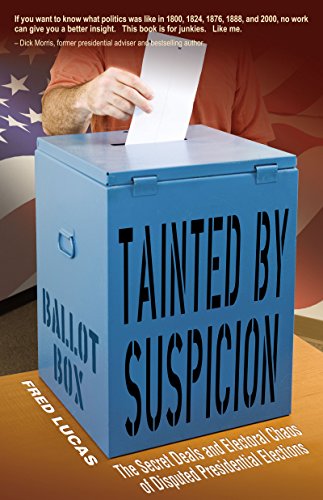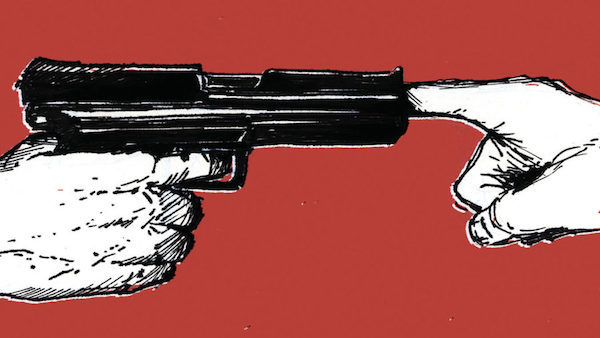Note: Fred Lucas’ new book Tainted by Suspicion: The Secret Deals and Electoral Chaos of Disputed Presidential Elections,” examines some of the rigged/contested presidential elections in American History. It is a book I enjoyed and recommend to everyone.
As interest in contested elections have grown, based on the tenor of the 2016 presidential race, Fred has agreed to update the guest post below which speaks to some of the other of “rigged” presidential elections You will find that Donald Trump charges are not as unique as you may believe.
Guest post by Fred Lucas
Whatever you think of Donald Trump not promising to immediately accept the election result, don’t believe anyone who says challenging the result would be unprecedented. Donald Trump is not the first candidate to say a presidential election was “rigged.”

People were up in even more of a lather in previous elections. Four times in the history of the United States, it wasn’t the voters, or even presidential electors, that chose the president. Rather, it was a separate branch of government. I write about these in my book, “Tainted by Suspicion: The Secret Deals and Electoral Chaos of Disputed Presidential Elections.”
In the nation’s history, four candidates who lost the popular vote became president, but there was by no means anything illegal about it. The Electoral College decides the presidency, not the popular vote. Until the Constitution is amended, it will remain that way. There is an effort among some states to undermine the Electoral College by agreeing to have their electors vote for whoever won the national popular vote. While this might not honor the wishes of the voters in their own state, state legislatures have the right to apportion electors however they wish. Other states have debated proportional awarding of electoral votes—as Maine and Nebraska already have. But again, it’s up to the states.
It should be noted that of the four presidents to emerge from these odd situations—Thomas Jefferson, John Quincy Adams, Rutherford B. Hayes and George W. Bush—there were no claims that Jefferson was selected rather than elected.
For most, 2000 is the frame of reference. But a majority was able to accept the Supreme Court’s verdict in Bush v. Gore, even though many Democrats take it as an article of faith they were robbed in Florida. But other examples are more profound. Two elections could have led to war.

Democrats, such as newspaper barons Joseph Pulitzer and Henry Watterson, talked about leading 100,000 armed men into Washington if their nominee Samuel Tilden didn’t win the presidency. It was actually talk, but Democrats and their media allies did spend the next four years calling President Rutherford B. Hayes, Rutherfraud. In reality, 1876 was a presidential election the Democrats stole, the Republicans stole back and like 2000, Florida was in dispute.
The election controversy came at a very touchy time for the country, just 11 years after the end of the Civil War. America could have been pushed to war again had some of the rowdier voices prevailed.
Similarly, after the 1800 Electoral College tie with Thomas Jefferson and his running mate Aaron Burr, the lame duck Federalist Congress considered installing Burr as president. Jefferson supporters were threatening armed rebellion. But, in the end, the country went through the first peaceful transfer of power, and Burr, of course, became disgraced on multiple other fronts. The infant country was at a delicate stage at this time, and there were legitimate fears about a French Revolution-style ideology spreading.
For all the wailing about how divided the country is along partisan and ideological lines today, we should ask: compared to when? Compared to the 1960s? Compared to the 1860s? Compared to when a sitting vice president would gun down a former treasury secretary in a duel? The story of the campaigns that went down to the wire also tells us that America is more than able to survive internal political tensions and unite.
The other elections, 1824 and 2000, didn’t come close to armed conflict. But after the 1824, John Quincy Adams had a stillborn presidency, dogged by the alleged “corrupt bargain” with Henry Clay. Further, 1824 most closely resembles 2016. It was the ultimate political insider, Adams, verses the in-your-face, sometimes foul-mouthed, politically incorrect outsider, Andrew Jackson. Jackson won a plurality but not a majority of both the popular and electoral votes, but lost the presidency.

And there were elections with suspicious results but were never strongly challenged.
Shortly after John F. Kennedy was inaugurated president, Senate Republican Leader Everett Dirksen—certain that election fraud in his home state of Illinois cost Richard Nixon the election, called FBI Assistant Director Cartha DeLoach to ask why there wasn’t an FBI investigation into the chicanery and voter fraud emanating from Chicago’s Daley machine.
“I told him that the Department of Justice was investigating this,” DeLoach recalled to the Washington Post. “I referred him to the attorney general.”
The exasperated Dirksen sarcastically asked, “Who’s the attorney general?”
DeLoach answered, “Bobby Kennedy.”
So, what about 2016? There’s a few scenarios.
Consider how close the race is in key states of Pennsylvania, Ohio and Florida and the high unfavorable ratings for both candidates. There could be a split with the popular and Electoral College vote.
None of this could happen, right? It’s too rare, almost unheard of.. Sort of like everything else in the 2016 election.
Fred Lucas is the author of “Tainted by Suspicion: The Secret Deals and Electoral Chaos of Disputed Presidential Elections” (Stairway Press, 2016).







